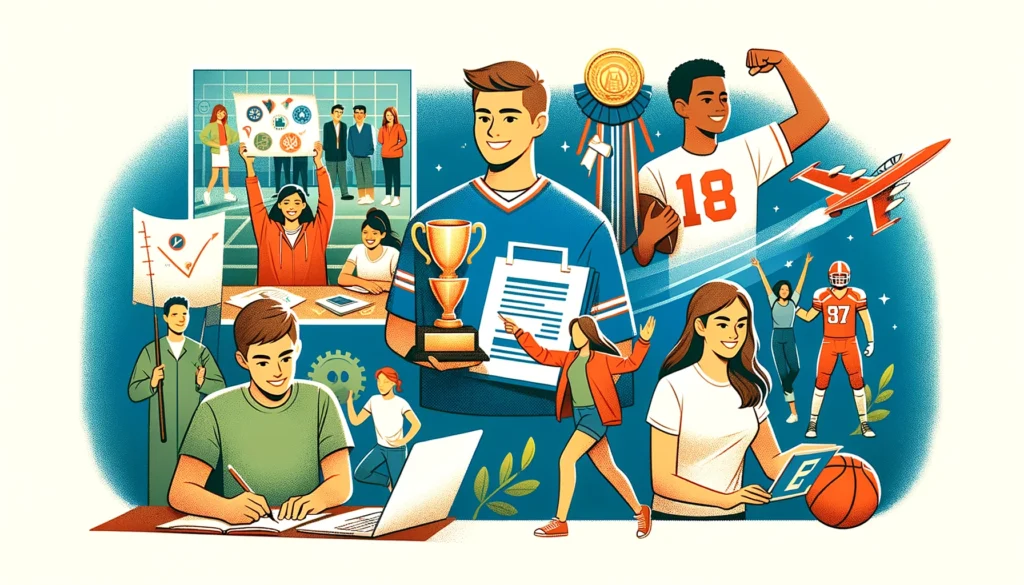Join us at “How to increase your chances of being awarded a scholarship for studying overseas: Expert Tips” and learn how to greatly enhance your chances of receiving scholarships to study abroad. Scholarships can be a valuable proposition for any student interested in getting a taste of a different culture and receiving an education internationally without the financial burden implied by it. This blog will not only give you an idea about general tips and tricks but also the tricks not many people tell you about when it comes to job applications.
Scholarships are more than just financial aid; they are a recognition of your past achievements and an investment in your potential. By understanding how to effectively showcase your strengths and align them with the scholarship’s goals, you can increase your chances of success significantly. Let’s explore how you can utilize these insights to craft compelling applications.
Understanding Scholarship Requirements
Knowing What’s Expected
Before you dive into the application process, it’s crucial to thoroughly understand the specific requirements. Each program has its own set of criteria, which can vary significantly from academic excellence and financial need to specific skills or geographic eligibility. For instance, the University of Melbourne’s scholarships detail very clear academic and residency requirements for potential candidates, emphasizing the need for a strong academic record and potential for research success.

Key Criteria Typically Considered:
- Academic Excellence: Require a certain GPA or equivalent academic achievements.
- Financial Need: Some are aimed at students who need financial assistance.
- Country-Specific Requirements: Many are available only to students from certain countries or regions.
- Field of Study: Certain are restricted to specific fields or disciplines.
Tailoring Your Application
Understanding these requirements allows you to tailor your application to meet these specific criteria. For example, if a scholarship values community service, you can highlight your volunteer experiences and their impact on your community. The Sabanci University in Turkey, for instance, provides scholarships that cover a range of academic programs and looks for outstanding international students who can demonstrate academic prowess and a commitment to contributing to their field.
Checklist for Scholarship Application Preparedness:
- Review Eligibility Criteria: Make sure you meet all the requirements before applying.
- Gather Necessary Documents: Prepare your transcripts, letters of recommendation, and any required essays or statements.
- Understand the Scholarship’s Goals: Align your application with the scholarship’s mission and goals.
By following these steps, you can ensure that your scholarship applications are not only complete but also compelling. Now, let’s take a moment to review what we’ve covered so far and ensure it aligns with your needs before moving on to strategic application tips. What are your thoughts on this section? Does it provide the clarity and depth you need to start your scholarship application journey?
Strategic Application Tips
When it comes to applying for scholarships, timing and strategy are as crucial as your academic credentials. Here, we’ll explore how to plan your scholarship applications strategically and why meeting deadlines is critical to your success.

Early Preparations and Deadlines
Starting early is not just about having your application in on time—it’s about giving yourself ample space to gather information, refine your essays, and seek feedback. For example, the University of Auckland requires applications to be submitted by specific deadlines, aligning with the start of academic semesters. Missing these deadlines can mean waiting another year or missing out entirely.
Why Deadlines Matter:
- Scholarship Allocation: Many scholarships are awarded on a first-come, first-served basis within qualified applicants.
- Time for Corrections: Early application allows time to rectify any errors or update information if circumstances change.
Creating a timeline can help manage these deadlines effectively. Set reminders for different stages of the application process, from drafting your first essay to sending final submissions.
Aligning with Scholarship Goals
Understanding the underlying goals of the scholarship can significantly boost your chances. For instance, the UCL’s IOE Centenary Scholarships are aimed at supporting students from lower-income countries to make a positive impact back home. If you’re applying for this, your application should clearly articulate how you plan to use your education to contribute to your community or field.
Strategies to Align with Scholarship Goals:
Personal Statement: Use this document to align your academic and career aspirations with the scholarship’s objectives.
Recommendation Letters: Choose referees who can vouch for your alignment with the scholarship’s goals, such as a mentor who has overseen your community projects or research endeavors.
Beyond Academic Excellence
While stellar grades are important, scholarships often look for well-rounded candidates who can demonstrate leadership, innovation, and commitment to their communities. This section explores how you can showcase these qualities effectively.

Extra-Curricular Activities and Leadership
Engagement in activities outside the classroom tells scholarship committees that you are a proactive and engaged student. For example, involvement in student organizations, sports teams, or community service projects can make your application stand out. The Sabanci University’s scholarships, for instance, look favorably upon students who have shown leadership potential and social involvement.
Activities to Highlight:
- Leadership Roles: Positions in student clubs, teams, or community groups.
- Volunteer Work: Impactful community service that shows commitment and responsibility.
- Artistic and Sporting Pursuits: Achievements in the arts or athletics can showcase your dedication and discipline.
Showcasing Personal Achievements
Personal achievements offer a glimpse into your character and drive. Whether these are academic awards, personal projects, or unique challenges you’ve overcome, they provide a narrative about who you are beyond grades.
How to Showcase Achievements:
- Awards and Honors: Any recognitions you have received for your academic or extracurricular efforts.
- Personal Projects: Initiatives you have started or contributed significantly to, which demonstrate creativity and initiative.
- Challenges Overcome: Personal stories that highlight resilience, adaptability, and determination.
Balancing a strong academic record with evidence of leadership and community engagement can significantly enhance your scholarship application. Let’s pause here for a moment—how do these strategies resonate with you? Are there particular areas you feel ready to tackle, or do you need more insights into making your application stand out?
Making Your Application Stand Out
Crafting a scholarship application that stands out in a pool of qualified candidates requires a mix of authenticity and strategic presentation. Let’s dive into effective ways to present your narrative and make a memorable impression on the selection committee.

Crafting Compelling Personal Statements
Your personal statement is a window into your motivations and aspirations. It’s where you can connect your past experiences with your future goals, clearly showing the scholarship committee why you are a perfect fit for their funding. This should not just reiterate your resume but should reflect your journey, challenges, insights, and how these have shaped your academic and career ambitions.
Tips for a Compelling Personal Statement:
- Be Authentic: Write in a genuine tone that reflects your true self.
- Show, Don’t Tell: Use specific examples that demonstrate your qualities and achievements, rather than simply asserting them.
- Tailor Your Message: Align your statement with the scholarship’s mission and objectives, much like how essay prompts guide submissions.
Securing Impactful Recommendations
Recommendation letters can significantly boost your application by providing a third-party validation of your capabilities and character. Choose recommenders who know you well and can provide specific details about your qualifications and suitability for the scholarship.
Strategies for Effective Recommendations:
- Choose Wisely: Select mentors or instructors who have closely worked with you, particularly in capacities relevant to the scholarship’s focus.
- Provide Context: Help your recommenders by reminding them of specific accomplishments or projects you’ve undertaken under their guidance.
- Guidance: Offer a list of points they might include, such as your leadership qualities, your project impact, or your academic strengths.
Utilising Technology and Social Media
In today’s digital age, leveraging technology and social media can play a pivotal role in your scholarship application process. From research to networking, these tools can provide a competitive edge.

Leveraging Digital Platforms for Research
Research is crucial not only for finding scholarships but also for understanding what each fund looks for in candidates. Platforms like ScholarshipPortal or Fastweb offer extensive databases of scholarships along with detailed information about application requirements and deadlines.
Effective Research Tools:
- Scholarship Search Engines: Use platforms specifically designed to filter scholarships by criteria such as study level, field, and eligibility.
- University Financial Aid Websites: Often list available scholarships and provide insights into application tips.
Networking Through Social Media
Social media platforms can connect you to scholarship boards, alumni of interest, and peer networks which can offer invaluable advice and insights. Engaging with these communities can provide insider knowledge on what makes a successful application.
Social Media Strategies:
- Follow Scholarship Pages: Keep up with updates, deadlines, and Q&A sessions that might be hosted on platforms like Facebook or LinkedIn.
- Engage in Relevant Groups: Join groups where past recipients share their experiences and tips.
- Professional Presence: Maintain a professional profile that reflects your academic and extracurricular activities aligned with your scholarship goals.
Harnessing these digital tools and your online presence effectively ensures you stay informed and connected, maximizing your chances of securing scholarships. Let’s pause here—does the integration of technology and personal storytelling strategies resonate with you as effective ways to enhance your scholarship applications? Are there specific tools or approaches you find particularly promising or challenging?
Financial Planning and Budget Management
Navigating the financial aspects of studying abroad extends beyond just securing a scholarship. Understanding and managing your budget can be crucial in ensuring a smooth educational journey. Here, we delve into practical tips for planning your finances effectively.

Anticipating Uncovered Expenses
Even the most generous scholarships might not cover all expenses. It’s important to anticipate costs such as travel, books, health insurance, and personal expenses which might not be included in packages. For example, like the one offered by UCL include a stipend and health insurance but may not cover other personal costs or travel expenses for family visits.
Typical Expenses to Consider:
- Travel Costs: Including flights, local transportation, and emergency trips.
- Living Expenses: Like accommodation beyond what might be provided, utilities, and personal expenses.
- Health Insurance: If not included, this can be a significant expense, especially in countries like the USA.
Creating a Budget
Creating a budget is crucial in managing your finances effectively while studying abroad. Break down your expenses into categories such as tuition (if not fully covered), accommodation, food, travel, entertainment, and emergencies. Track your spending and adjust your budget as needed to ensure you’re living within your means but also making the most of your study abroad experience.
Budgeting Tools:
- Apps like Mint or YNAB: These can help you track your expenses and set budget goals.
- Excel Spreadsheets: Customizable and great for keeping detailed records.
Conclusion
As we wrap up this guide on boosting your scholarship applications for study abroad programs, remember that securing a scholarship involves much more than just meeting academic criteria. It requires approach, an apt understanding of the purpose of the scholarship and a life story that would fit the intent behind the scholarship. Now, it’s time for you to take these insights and apply them to your scholarship applications. Whether it’s highlighting your extracurricular achievements, leveraging digital tools, or meticulously planning your budget, each aspect plays a critical role in your application’s success.




